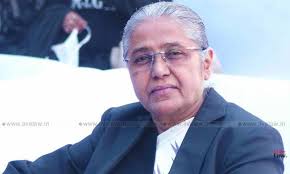Judge Ruth Banumathi: Hindu Named, But Jesus following Judge?


A recent video posted on Twitter shows Supreme Court Judge R. Banumathi giving a farewell speech before her retirement, which is today July 19th. One moment during her farewell speech (given remotely on Zoom due to the pandemic) is noteworthy:
“Though I am a Hindu, I believe in the gospel of Jesus. I got educated and came up in life […] During my judicial service, there were mountains of obstacles for no reason. Yet no human hand could prevent what Jesus Christ has ordained from me in my life.
Banumathi says she believes in the Bibl but she's a Hindu. This of course IS A LIE as that statement would go against the FIRST COMMANDMENT & the basic grain of Xtianity. #SleepingHindus there r many more hiding in high positions working for ur extinction. When'll u wake up? pic.twitter.com/grJjSenr9K
— Mission Kaali – Say No To Conversion (@missionkaali) July 19, 2020
This statement raises many questions about the integrity of the now-retired judge. Questions that many discerning people should ask.
First, can a Hindu be a Hindu but believe in Jesus, the gospel and overall, Christian doctrine at the same time. Almost all Christian theologians and lay Christians will say “absolutely not!”. The ten commandments, which from the underpinning law of Christianity, is unequivocal in who Christians can worship. In particular, the first commandment: “And God spoke all these words: “I am the Lord your God, who brought you out of Egypt, out of the land of slavery. “You shall have no other gods before me” (Exodus 20:1-3).
To further emphasize the exclusivist nature of the Christian god Yahweh, here is the second commandment: “You shall not make for yourself an image in the form of anything in heaven above or on the earth beneath or in the waters below. You shall not bow down to them or worship them; for I, the Lord your God, am a jealous God, punishing the children for the sin of the parents to the third and fourth generation of those who hate me, but showing love to a thousand generations of those who love me and keep my commandments” (Exodus 20:4-6).
So, with that mind, the second question people should ask is “Is Judge Banumathi a Hindu or a Christian”? As shown in the paragraph above, if you profess your belief in Jesus, that means you are only to believe in Jesus and no one else. And in Christian theology, Jesus and the Christian god Yahweh are considered one and the same, along with the holy spirit. We also see in the paragraph above that this god Yahweh does not want his believers to worship other gods. This is further formalized in the Nicene Creed (https://www.crcna.org/welcome/beliefs/creeds/nicene-creed), which is important to Catholics and nearly every Protestant denomination.
The third question one should ask is if she is a Christian, did she misuse benefits that are meant for those who are scheduled caste? More than one article has alluded to her caste status (https://theprint.in/opinion/the-nepotism-and-caste-based-discrimination-that-exists-in-indian-judiciary/48542/). However, the availability of reservations for converts who still keep their caste certificate remains controversial. Christianity has no concept of varna, jati, or caste. So anyone who converts to Christianity from Hinduism will theoretically be free from their former caste, not needing to identify with it anymore.
So why the need to hang onto the former caste status after conversion? It’s because of the reservation benefits. A Christian or Muslim will only be eligible for benefits meant for the backwards castes, which includes other castes not considered scheduled castes.
Keep in mind, India is considered a secular country, and there are no prohibitions on who can run for office or serve in the judiciary. India has had people from all religions in prominent positions since independence. So what is this need for a convert to conceal their true religion? And if a person feels the need to lie about what their religion actually is, it brings to question their integrity and ethics. Judge Banumathi’s various decisions during her 32 year tenure, including the banning of jallikattu should be, should be examined.
In addition, Judge Banumathi must be investigated for possible misuse of scheduled caste benefits. If she has been found to have misused scheduled caste benefits, then action needs to be taken so that she doesn’t get away with it. Judge Banumathi is hardly the only person who has converted to Christianity but has retained their Hindu name and caste certificate. The time is now to help make India a less corrupt country.
DISCLAIMER: The author is solely responsible for the views expressed in this article. The author carries the responsibility for citing and/or licensing of images utilized within the text.
